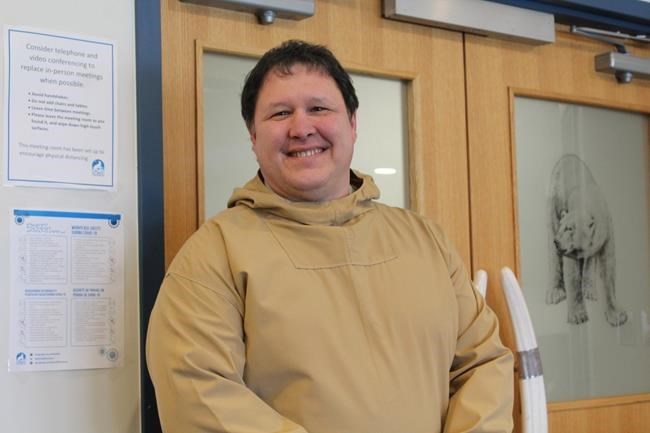IQALUIT, Nunavut — The Nunavut government says its finances aren't as bad as it originally predicted despite spending made necessary by the COVID-19 pandemic.
Nunavut tabled a $2.4-billion budget Tuesday that focuses on adding health-care services in the territory. The figure includes $4.8 million for the creation of a Pandemic Response Secretariat.
The secretariat, which adds 30 new positions to Nunavut's public sector, is to manage services addressing the COVID-19 crisis.
Last year, Finance Minister George Hickes projected Nunavut's deficit would be the largest yet — higher than $30 million.
But the 2020-2021 deficit sits at $21 million, in part because federal funding was provided to help deal with the pandemic. Hickes predicts next year's deficit to be even lower at $14 million.
"Had we not received this federal support, I would be reporting a significantly different fiscal situation today," Hickes said.
The federal money includes $130 million for COVID-19-relief and $58 million to cover medical travel costs for Nunavut residents.
Last year, Nunavut spent $64.2 million on isolation hubs for Nunavummiut returning to the territory. Quarantining at the hubs is mandatory and has been in place since the pandemic hit last March. Another $30 million was spent last year to put up construction workers in the isolation hubs before they flew up to Nunavut for projects.
Nunavut also spent $55 million last year to support Canadian North and Calm Air, the territory's airlines, from April to September.
The 2021-2022 budget doesn't dedicate new dollars specifically to COVID-19 relief. Hickes said that's because most of what's needed to support Nunavummiut during the pandemic has already been secured through federal funding.
"A lot of the operational network ... on the COVID response has been created," he said.
Hickes also said the territory can't anticipate what future costs related to the pandemic will be.
"We don't know exactly what those costs are. We don't have a timeline. We don't have a finish line," he said.
"Some of those moneys have been tapped from the third-party funding, and that's why we're leaving a cushion in case there are any shortfalls."
That cushion is a $75-million contingency fund, up from $50 million in last year's budget.
The 2021-22 fiscal plan also commits funding for a new bachelor of social work program at Nunavut Arctic College and $1.2 million to pay for a new colorectal cancer screening program in Iqaluit.
"One of the things COVID has enhanced ... (is) that we need to bring more services closer to home and more in-territory care," Hickes said.
Hickes said the government's revenues for the next fiscal year are predicted to be almost $2.4 billion.
Members of the legislature are to spend the next few weeks reviewing and voting on whether to approve the budget.
This report by The Canadian Press was first published Feb. 23, 2021
___
This story was produced with the financial assistance of the Facebook and Canadian Press News Fellowship
Emma Tranter, The Canadian Press



